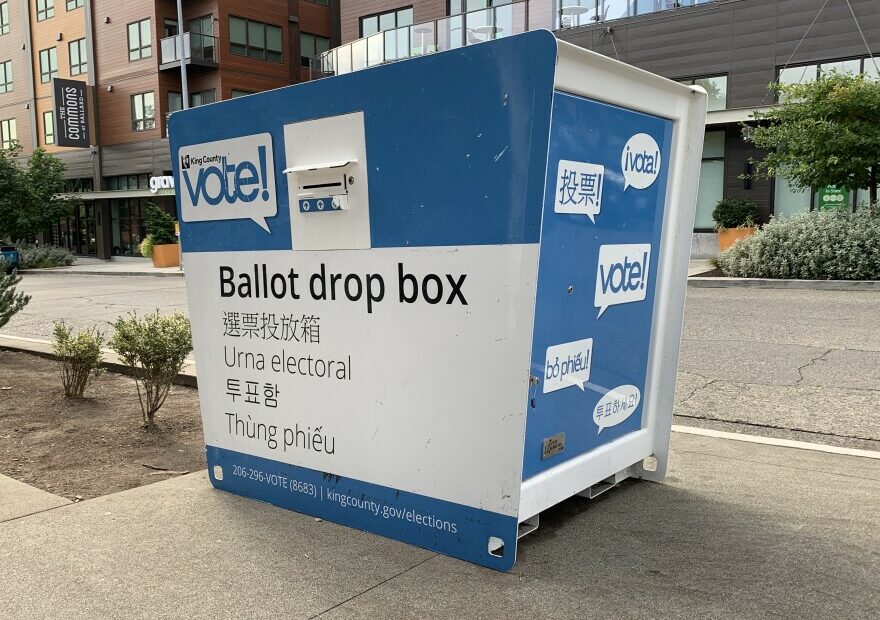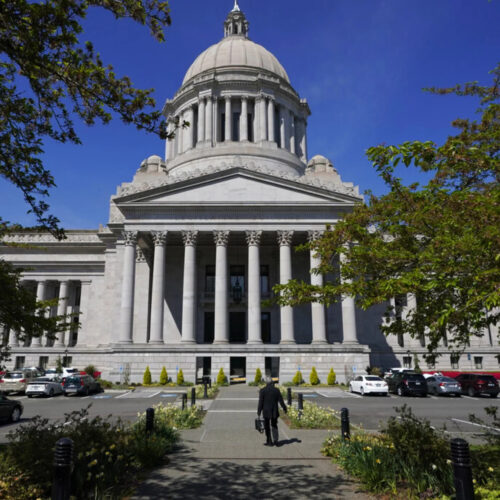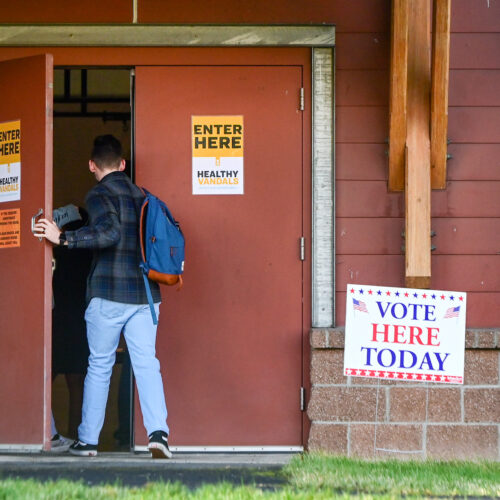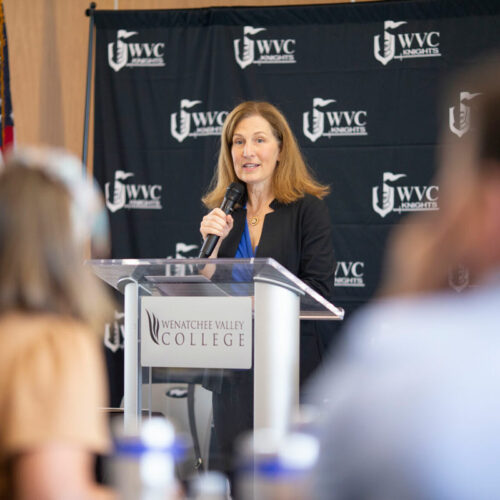With federal voting rights legislation stalled in Congress, majority Democrats in the Washington Legislature are contemplating an expansion of a 2018 state-level voting rights law aimed at increasing minority representation.
Democrats are also advancing an automatic voter registration bill modeled after similar laws in states like Oregon and Colorado that have been credited with diversifying the electorate.
The efforts to make it easier to vote in Washington, a blue state, come as many red states are heading in the opposite direction; passing laws to restrict access to the ballot box in the name of election security.
“I can’t control what happens in Georgia,” said Democratic state Sen. Rebecca Saldaña of south Seattle. “But I can make sure that we create some hope for people in other states.”
Saldaña, the deputy majority leader in the Washington Senate, is the prime sponsor of a bill that would allow certain organizations, not just individuals, to file a claim under the Washington Voting Rights Act (WVRA).
The measure would also require certain jurisdictions — such as cities with 10,000 or more residents where at least 10 percent of the voting age population are members of a protected class — to obtain advance judicial approval, known as pre-clearance, before taking actions like reducing the number of ballot drop boxes.
“In Washington State, we lead the way on a lot of issues. And I think this is a place where, if we believe in democracy, then we want to make sure that we have the strongest protections to really not water down anyone’s vote,” Saldaña said.
The second bill under consideration in the state Senate would expand Washington’s “motor voter” law so that people who have an enhanced driver’s license or ID card, or have otherwise proven their U.S. citizenship, would be automatically enrolled to vote. The measure would also ensure that when a driver updates their address with the Department of Licensing, that information is also refreshed in the voter rolls.
At the same time, the bill would put in place new safeguards against noncitizens getting registered to vote. For instance, if a driver’s license applicant presented a green card during their licensing transaction, they would not be offered the opportunity to register to vote.
“That protects noncitizens from making an inadvertent mistake that would have negative immigration consequences for them,” said Alex Tischenko with the Center for Secure and Modern Elections during legislative committee testimony. “It also promotes election integrity by helping to ensure registrants are eligible voters.”
Both measures have passed out of the Senate’s State Government and Elections Committee along party line votes.
Asked recently about the proposals, Senate Republican Leader John Braun called it “premature” to change the four-year-old WVRA.
Regarding the motor voter bill, Braun urged caution and suggested it could further inflame people who already don’t trust the election system.
“I just think adding more things like this without very carefully thinking through it adds questions,” Braun said. “That doesn’t help us in Washington state or nationally.”
Meanwhile in Oregon, where the Legislature just convened, majority Democrats have introduced bills this year to allow people to register to vote using a social security card and to permit certain voters — such as members of the military or people living overseas — to cast their ballots digitally via the internet.
Washington and Oregon’s efforts to expand access to voting stand in stark contrast to what the Brennan Center for Justice at New York University calls a tidal wave of restrictive voting legislation in many other states, fueled by the so-called “Big Lie” that the 2020 election was stolen from former President Donald Trump.
Last year, according to a Brennan Center analysis, 19 states passed 34 laws that limit access to voting. Examples include shortening the window to apply for a mail ballot, imposing new voter ID requirements and limiting voting days or hours.
But that same analysis also found that 25 states enacted 62 laws last year to make it easier to vote. That included a new Washington law that automatically restores the voting rights of people coming out of prison.
A similar analysis by the Voting Rights Lab also found that most of the 2021 laws that passed “actually expand voter access or improve election administration.”
“That’s fantastic, but unfortunately what it means is that we have these diverging trends in different parts of our country,” said Sean Morales-Doyle, the acting director of the Democracy Program at the Brennan Center. “Your access to democracy depends more and more on where you live in the country.”
Even as Democrats in the Washington Legislature work to expand access to the ballot, some minority Republicans are embracing the Trump narrative that mail-in voting is vulnerable to fraud and vote counting machines can’t be trusted.
“My belief is there was a lot of fraud associated with the 2020 elections,” said state Rep. Brad Klippert, a Benton County sheriff’s deputy who’s currently running for Congress.
Klippert is one of three Washington Republican state lawmakers who used taxpayer funds to attend an election fraud “Cyber Symposium” in South Dakota last summer. According to reporting by The Seattle Times, the event, organized by MyPillow CEO Mike Lindell, was “rife with debunked conspiracy theories.”
Klippert, who called the symposium “extremely valuable,” is the prime sponsor of half-a-dozen election-related bills. They include a measure to end mail-in voting and return to in-person voting. Another of his bills would require hand counts of ballots, instead of machine counts.
“I strongly believe in voting in-person …. and then hand-counting them with observers there from both sides to make sure that the process is in fact truthful and accurate,” Klippert said.
Other proposals from Klippert and a small cadre of conservative state house Republicans would prohibit ballots from being faxed or emailed, require watermarks on ballots and reject ballots with missing or illegible postmarks. Another bill would require proof of citizenship to register to vote in Washington.
Despite claims of a stolen election by Trump and his supporters, there’s no evidence of widespread fraud in the 2020 presidential election or in Washington’s vote-by-mail elections. Additionally, election professionals say that machine counts are more accurate than hand counts. But Klippert doesn’t accept that and has also introduced a bill to allow the Legislature to authorize what he calls an “independent forensic audit” of a Washington election by a nongovernmental entity.
“They did one in Maricopa County, Arizona and they found many, many, many anomalies in that deep forensic audit and I would like to do the same in Washington state,” Klippert said. “I just want the truth of what happened in the 2020 elections.”
The “audit” Klippert referred to in Arizona was conducted by a firm called Cyber Ninjas at the behest of Republicans in the Arizona Senate. Ultimately, the effort — which critics lambasted as farcical — affirmed the election results while also highlighting alleged irregularities that election experts called “baseless or uninformed,” according to reporting by NPR.
While Klippert’s bills have drawn a handful of conservative co-sponsors, Democrats haven’t given them a public hearing and his views do not appear to be widely held by legislative Republicans.
“We’ve done a lot of research and I believe the state of Washington has one of the best election systems in the country,” said Republican state Sen. Judy Warnick of Moses Lake in January.
Braun, the Senate Republican leader, also recently affirmed that “I believe in our election system.”
One Republican-sponsored measure that did receive a public hearing last month, but hasn’t advanced out of committee, aims to address the issue of voter confidence.
Sponsored by state Sen. Keith Wagoner, a candidate for secretary of state, it would require, among other things, that the Washington State Patrol take a sample size of returned ballot envelopes and compare the signatures on those envelopes with the voter signatures on files.
Meanwhile Democrats are also advancing bills this year that respond to heightened tensions and threats of violence surrounding elections.
One measure would ban guns and other weapons from all county election offices, voting centers and ballot counting facilities. The state Senate also recently unanimously repassed a bill from last year that would make it a felony to harass an election official.
Following the 2020 election, Washington’s then-state elections director, Lori Augino, was among election officials nationally who faced threats.
A House Committee has also approved a bipartisan bill requested by the Secretary of State’s office that would exempt voter signatures, phone numbers and email addresses from being released under the state’s public records law. This follows what’s been described as “voluminous” public records requests for ballot return envelopes which contain this personal information.
One issue, though, that has yet to get much attention in Olympia is a recent report by the Washington, DC-based Bipartisan Policy Center (BPC) that urges state legislatures to act this year to clarify the rules surrounding election observers in advance of the 2022 midterm elections.
The BPC report warns that “without the proper guardrails in place, election observation can become a partisan or prejudicial tool used to disrupt orderly elections and undermine voter confidence.”
A BPC report card on Washington elections found the state fully complies with only two of five key recommendations. The group is urging state officials to clarify how many observers from each party are allowed to be present at each step of the election process and establish a clear process for removing a disruptive observer. Additionally, BPC recommends the state require and fund training for all observers in advance of the election.




















